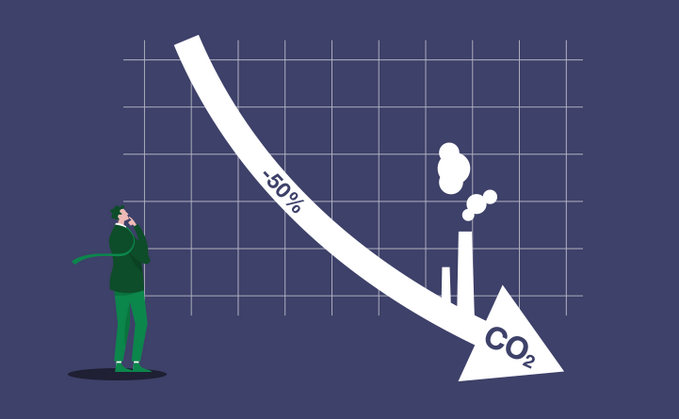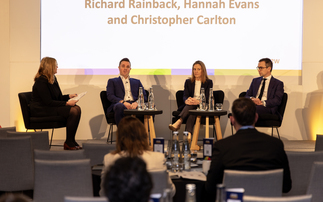
As tens of millions of viewers around Europe and the world tuned into the Euro 2020 football competition this summer, their eyes may have picked out a new slogan on the pitch side billboards.
VW, Europe's biggest carmaker[1] and one of the competition's sponsors, was using its prime advertising space to promote their commitment to being carbon-neutral or ‘Net Zero' by 2050. That choice reflects how quickly awareness of climate change has risen among Europeans.
More and more companies, investors, and governments are committing to Net Zero.
Why it feels like everyone is going Net Zero
If humanity will ever stabilise human-induced global temperature increases, no matter what temperature level is chosen as the maximum, whether it be 2°C or 1.5°C, at some point the planet must reach Net Zero on greenhouse gas emissions. Without Net Zero, global temperatures will keep rising forever.
On average, temperatures today are above 1°C higher than the preindustrial level. Net Zero has the power to cap the overall increase at a level that causes the minimum amount of climate change. That's driving what we call "the race to Net Zero" - and to navigate this new world, there are certain important tips to bear in mind.
#1: It all starts with the "carbon budget"
"Carbon budget" refers to the remaining amount of CO2 emissions that can be emitted globally, beyond which point a given temperature outcome (e.g. above 1.5°C or above 2°C) is ‘locked in'.
Carbon budgets can be accurately calculated because we increasingly understand the correspondence between cumulative emissions and the level of warming.
Between 1850-2019, approximately 2390Gt CO2 was emitted.[2] To have a roughly 2/3 (67%) chance of keeping warming to 1.5°C, there is around 400-500Gt CO2 left to ‘spend'. Currently, the world emits 42Gt per year - a figure which would use up the remaining amount in 10-15 years.
When you hear someone talk about carbon budget, it really refers to a very simple concept. We have already spent 2390Gt. We have around 500Gt left to spend. The carbon budget is all about how to spread out that final allowance over time.
Step 2: "Base years" make a big difference
When interpreting a commitment that promises a percentage decrease in emissions by a certain point, a base date is required to make any sense of it. You can say "I will halve my consumption of chocolate" - but do you mean compared to the two bars eaten yesterday, or the 20 bars eaten on this day last month?
Take the example of Lyxor's Paris-Aligned ETFs. These use a methodology that applies an immediate -50% reduction in GHG emissions in an allocation compared to its parent index (e.g. a S&P 500 Paris-Aligned ETF refers to the S&P 500 index). They then continue to decarbonise from this point at a rate of -7% per year.
Now we must ask ourselves: what is the base year? Lyxor's Paris-Aligned ETFs are anchored to 2019, meaning they immediately reduce the portfolio's carbon intensity by 50% from its 2019 level, and continue reducing it further each year.
Step 3: Challenging baked-in assumptions
Net Zero commitments are at best trajectories for change over several years. Those trajectories are based on important assumptions, including the ability to decarbonise at a given pace in future, or the development of effective carbon capture & storage solutions to mitigate emissions.
IPCC Model Pathway Reference (P2)

It's important to be realistic with ourselves about these assumptions. In some cases, the technology that is expected to deliver improved carbon removal, is still in the theoretical or prototype stage. The assumptions can change over time.
Net Zero is an extremely positive shift: but it still requires proper scrutiny
None of this is to take anything away from the importance of Net Zero and the great progress that has already been achieved. Lyxor is a firm believer in the urgency of climate change, and we believe that all market participants should feel equipped with the best possible information to make the right choices - including the ability to scrutinise headlines and assess commitments with a clear eye.
Our Guide to Climate Investing was written with this goal in mind, to help investors put the Paris Agreement goals into practice. We are updating the guide this month with the latest climate updates. In the meantime, all the key information on Lyxor's full climate ETF range is available on our ESG Hub.
This communication is issued by Lyxor Asset Management UK LLP for the exclusive use of investors acting on their own account and categorised either as "Eligible Counterparties" or "Professional Clients" within the Meaning of Markets in Financial Instruments Directive 2014/65/EU. These products comply with the UCITS Directive (2009/65/EC). Capital is at risk. Lyxor Asset Management UK LLP recommends that investors read carefully the "investment risks" section of the product's documentation (prospectus and KIID). The prospectus and KIID in English are available free of charge on www.lyxoretf.com, and upon request to [email protected]. Lyxor Asset Management UK LLP is a limited liability partnership which is authorised and regulated by the Financial Conduct Authority in the UK under Registration Number 435658.
[1] Source: ACEA, 2020 Motor vehicle registrations in Europe, March 2021
[2] IPCC AR6 report, 7 August 2021, https://www.ipcc.ch/report/ar6/wg1/downloads/report/IPCC_AR6_WGI_SPM.pdf















